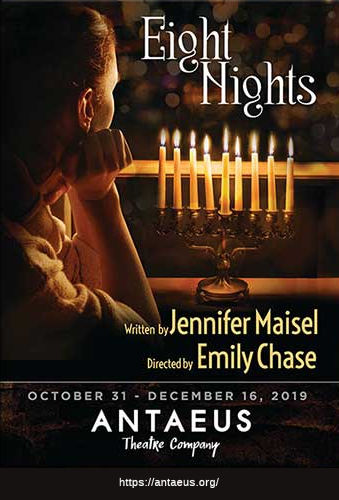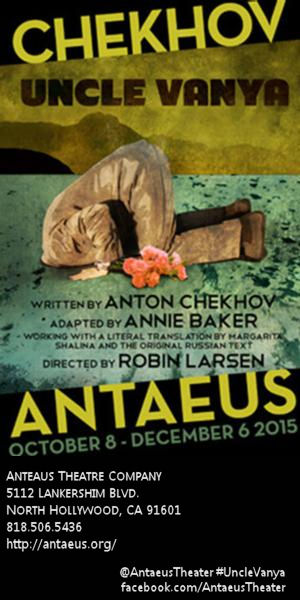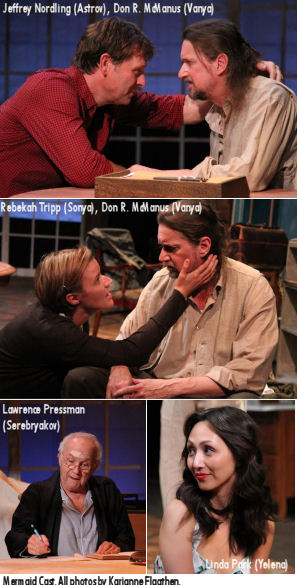
 One thing I’ve noticed about the congregation of which I’m a member (Temple Ahavat Shalom in Northridge) is that there is a love of live performance. At almost every theatre event I attend, or most concerts, I’ll run into a member of the congregation. I think, perhaps, it relates to the value of storytelling in our culture, the value of shared experiences, and the joy that comes from being in a room with other people. Theatre creates community, and so does our congregation.
One thing I’ve noticed about the congregation of which I’m a member (Temple Ahavat Shalom in Northridge) is that there is a love of live performance. At almost every theatre event I attend, or most concerts, I’ll run into a member of the congregation. I think, perhaps, it relates to the value of storytelling in our culture, the value of shared experiences, and the joy that comes from being in a room with other people. Theatre creates community, and so does our congregation.
I mention all of this because our congregation recently started a number of small aligned interest groups on various subjects — all ways to build community. I suggested a group centered around live theatre; as I get so many press releases and announcements of theatre, I offered to facilitate it. My goal is to build a group that will go to theatre with Jewish themes, to provide a forum for discussion, exploration, and education. The themes may not always be overtly Jewish, but they will relate to Jewish values, Jewish thought, Jewish questions, and the Jewish experience.
Our little group had its first outing last Sunday: to see the production of Eight Nights at the Antaeus Theatre Company (FB) in Glendale. The reason becomes clear when you read the press release I received from the publicist:
A German Jewish refugee is haunted by her past, but resiliently moves toward the future. Antaeus Theatre Company presents the world premiere of Eight Nights, a story developed in the Antaeus Playwrights Lab that honors the global refugee experience. Written by Jennifer Maisel (FB) and directed by Emily Chase (FB), Eight Nights opens at the Kiki & David Gindler Performing Arts Center in Glendale on Nov. 8, where performances continue through Dec. 16. Low-priced previews begin Oct. 31.
Set during eight different nights of Chanukah over the course of eight decades, Eight Nights tells the story of Holocaust survivor Rebecca Blum, who arrives in America at age 19 to forge a new life. As Rebecca moves through time, the play explores the lives that come and go in her New York apartment, where ghosts of the past both haunt and guide her. Maisel lyrically weaves together heart-aching moments with life-affirming humor to call out the trauma experienced not only by concentration camp survivors, but by African American descendants of slavery, by interned Japanese Americans, and by current victims of war in Africa and the Middle East.
“It was essential to me — seeing the parallels between the Syrian refugee crisis in 2017, when I started writing the play, and the Jewish refugee crisis of the 1930s — that this piece be an exploration of the universality of that experience and its overlap with other communities,” explains Maisel. “It’s about people finding a way to live after surviving loss and trauma, and witnessing how that brings joy to the future.”
This play seemed appropriate because it was more than your traditional Holocaust play. If I had wanted to do that (and I could fit it into my schedule), I would have taken the group to see The Diary of Anne Frank which was being produced up in Newhall. But this took a different approach: it didn’t look at the Holocaust; it looked at the impact of the Holocaust on the survivors. How it shaped their lives and attitudes afterwards. How their experience had parallels in the experiences of other cultures. How today’s refugee situation often requires us to put out that hand that wasn’t often put out for the Jews back during WWII. It was a true echo of the line we say on Passover, remembering that we were slaves, we had that experience, and that memory shapes our ethics.
As noted in the press summary, the play focuses on Rebecca Blue, who comes over to the US in 1949 at age 19, to live with her father. He is the only surviving family member: Rebecca’s mother and two sisters perished in the camps, although they remain as ghosts to her. We then see her in scenes that progress approximately 10 years per jump, always to the next night of Chanukkah. We see how she gets married, how she starts a business with the wife of the man who saved her from the camps, how she has to face telling her daughter about her story, how her daughter comes home with a non-Jewish man — half Japanese, half-Irish — who is researching the parallels between the internment and the holocaust. How that relationship progresses into the generation of Rebecca’s granddaughter and her unconventional relationship. It closes with Rebecca in her 90s, as they invite a Syrian refugee family into their apartment.
Throughout the show, there are interesting parallels drawn to other cultures. The first are some of the parallels to the black experience in America, followed by the internment of the Japanese. There’s an undercurrent of resilience: of letting the past shape you but not define you. We see the stress these experiences bring, and how the survivors often didn’t want to talk about them until it was almost too late. Eventually, they came to learn that by sharing the experiences, others could grow.
There were a number of “gasp” moments: I vividly remember when Rebecca was telling her story to an interviewer — she brought back what the camps must have felt like for the survivors. There was the audience reaction when the granddaughter displayed a tattoo that she thought would honor the experience, only to learn that it was more of an insult. There was the business partner sharing the story of having to have “the talk” with her son.
All in all it was a very touching piece. Our little group went out afterwards for coffee/tea, and the consensus was similar: a very moving and appropriate piece for our first outing.
Director Emily Chase (FB) did a wonderful job of creating the apartment that serves as the “home” for the story, and for working with the actors to bring it to life. She did a particularly good job of handling the multiple characters that each actor played: multiple actors portray Rebecca at various ages; the same actors play her daughter and granddaughter. Each brought a unique characterization to the character. The actors also silently portrayed ghosts of their characters who through movement and expression alone commented on the story Discussing the show with one of our group members after the show, he provided a great summary of what the director brings: the director builds the cup, and the actors help to fill it. As I understand that phrase, the means the director established the structure for the story, taking the words from the page of the author and creating the realization in the world while staying true to the story’s intent; it is the actors that then create the characters, with the director helping to fine tune the creation.
So let’s turn to those creations. Two actors create the main character, Rebecca Blum: Zoe Yale (FB) Younger Rebecca / Amy / Nina and Tessa Auberjonois (⭐FB) Anna / Older Rebecca. We meet Yale’s Rebecca first, with Auberjonois’ Anna as the ghost as she is a nervous 19 year-old meeting her father after he seemingly abandoned them, she had a harrowing travel on the MS St. Louis., returned to Germany to be separated from her mother and sister, and then be rescued by a US solder at Dachau. Yale also handles the scene where Rebecca is newly married with a child on the way, meeting that soldier and his wife. Yale handles these scenes very believably and with a nice tenderness. She then switches places with Auberjonois, who takes over as Rebecca whilst Yale becomes first Rebecca’s daughter Amy, and then her granddaughter, Nina. Yale does a great job of creating different personas and characterizations for the younger women. Auberjonois seamlessly handles the older Rebecca well, doing particularly well with her aging in the final scenes. I was particular impressed with what Auberjonois brought to the stage this weekend, having lost her father earlier in the week. It can’t be easy, and if she reads this by chance: condolences to her family on their loss.
The primary men in Rebecca’s life are played by Arye Gross (FB) Erich / Joram and Josh Zuckerman (FB) Aaron. We meet Gross’s Erich first: a seemingly genial fellow, who doesn’t seem to have been affected that much by Germany, or the loss of his wife and other daughters. Perhaps he had moved past that already. He is around for the first few scenes, and then hovers as a ghost for a while, reappearing in the end as the father of the immigrant family. Zukerman was stronger as Aaron, Rebecca’s husband. He provides an unspoken strength behind her and supporting her, and captures the character well.
The other two primary actors we meet are Christopher Watson Benjamin / Matt and Karen Malina White (⭐FB, FB) Arlene / Lacey. Watson captures the character well of the soldier (Benjamin) that rescued Rebecca, but has equal PTSD from what he has seen. He has a smaller role in a later scene where Rebecca is interviewed and recorded as the camera operator. I really likes White’s portrayal of Arlene, Benjamin’s wife and Rebecca’s future silent business partner. She brought a wonderful exuberance to the role; she brought a similar energy to Lacey, Nina’s partner.
Rounding out the cast was Devin Kawaoka (FB) Steve / Inge, as Amy’s Irish/Japanese husband. He had a nice playfulness and good chemistry with Yale’s Amy.
Lastly, turning to the production and creative side: Edward E. Haynes Jr.‘s Scenic Design created a believable apartment that adapted well over the subsequent decades; this was aided by Alex Jaeger (FB)’s Costume Design for the period appropriate costumes and David Saewart‘s Prop Design. Adam R. Macias‘ Projections told the audience the specific date and time. Jeff Gardner (FB)’s Sound Design provided appropriate sound effects, and Karyn D. Lawrence‘s lighting worked to establish the mood and draw attention where appropriate. Other production credits: Lauren Lovett Dialect Coach; Paula Cizmar New Play Dramaturg; Bo Foxworth Fight Choreographer; Ryan Mcree Dramaturg; Heather Gonzalez (FB) Production Stage Manager; Connie Ayala Asst. Stage Manager; Adam Meyer Technical Director; Lucy Pollock Publicity; Bill Brochtrup Artistic Director; Kitty Swink Artistic Director and Ana Rose O’Halloran Executive Director.
Unfortunately for you, Eight Nights closed last night (Monday, 12/16). But perhaps another theatre will choose to mount it. For information on other Antaeus productions, visit https://antaeus.org/.
🎭
Ob. Disclaimer: I am not a trained theatre (or music) critic; I am, however, a regular theatre and music audience member. I’ve been attending live theatre and concerts in Los Angeles since 1972; I’ve been writing up my thoughts on theatre (and the shows I see) since 2004. I do not have theatre training (I’m a computer security specialist), but have learned a lot about theatre over my many years of attending theatre and talking to talented professionals. I pay for all my tickets unless otherwise noted (or I’ll make a donation to the theatre, in lieu of payment). I am not compensated by anyone for doing these writeups in any way, shape, or form. I currently subscribe at 5 Star Theatricals (FB), the Hollywood Pantages (FB), Actors Co-op (FB), the Soraya/VPAC (FB), and the Musical Theatre Guild (FB). Through my theatre attendance I have made friends with cast, crew, and producers, but I do strive to not let those relationships color my writing (with one exception: when writing up children’s production, I focus on the positive — one gains nothing except bad karma by raking a child over the coals). I believe in telling you about the shows I see to help you form your opinion; it is up to you to determine the weight you give my writeups.
Upcoming Shows:
Our last show in December, other than the movie on Christmas Day will be Elf at Canyon Theatre Guild on December 21.
Looking to early 2020: most of the January is currently quiet, but the middle of the month is busy, with What The Constitution Means To Me at the Mark Taper Forum, and Frozen at the Hollywood Pantages (FB) the third weekend, and Cirque Éloize at the Soraya/VPAC (FB) the last weekend. Things start heating up in February, with The Last Ship (with Sting) at the Ahmanson Theatre the first weekend; A Body of Water at Actors Co-op (FB) and It Shoulda Been You at Musical Theatre Guild (FB) the third weekend; and (whew!) The Simon and Garfunkel Story at the Hollywood Pantages (FB), Escape to Margaritaville at the Dolby Theatre/Broadway in LA (FB), and Step Afrika at the Soraya/VPAC (FB) the fourth weekend. Yes, that is the Pantages and the Dolby the same day — that’s what I get for not entering season tickets on my calendar before ticketing a bonus show. March comes in like a lamb, with the first two weekends (2/29 and 3/7) being quiet… but goes out like a Lion. The 2nd weekend brings the MRJ Man of the Year dinner (and possibly The Wild Party at Morgan Wixson); the 3rd Morris’ Room at Actors Co-op (FB) ; and the last bringing Spongebob Squarepants at the Dolby Theatre/Broadway in LA (FB) and the MoTAS/TBH Seder. April is similarly busy: the 1st weekend is Mamma Mia at 5 Star Theatricals (FB); the 2nd is during Pesach and is open (but has Count Basie at the Soraya/VPAC (FB) the Thursday before); the 3rd is Once on This Island at the Ahmanson Theatre; the last is Hamilton at the Hollywood Pantages (FB) (and possibly Hands on a Hardbody at the Charles Stewart Howard Playhouse (FB)), and the first weekend of May is Mean Girls at the Dolby Theatre/Broadway in LA (FB)
As always, I’m keeping my eyes open for interesting productions mentioned on sites such as Better-Lemons, Musicals in LA, @ This Stage, Footlights, as well as productions I see on Goldstar, LA Stage Tix, Plays411 or that are sent to me by publicists or the venues themselves. Want to know how to attend lots of live stuff affordably? Take a look at my post on How to attend Live Theatre on a Budget. Want to learn about all the great theatre in Southern California? Read my post on how Los Angeles (and its environs) is the best area for theatre in the Country!



 Until last night, the only
Until last night, the only 